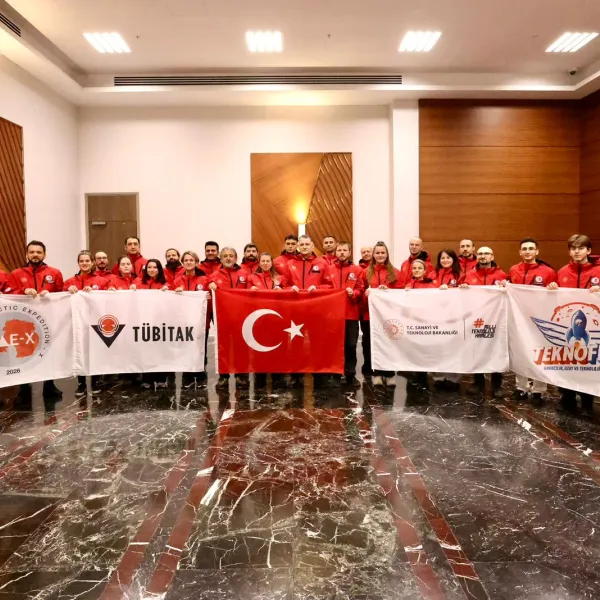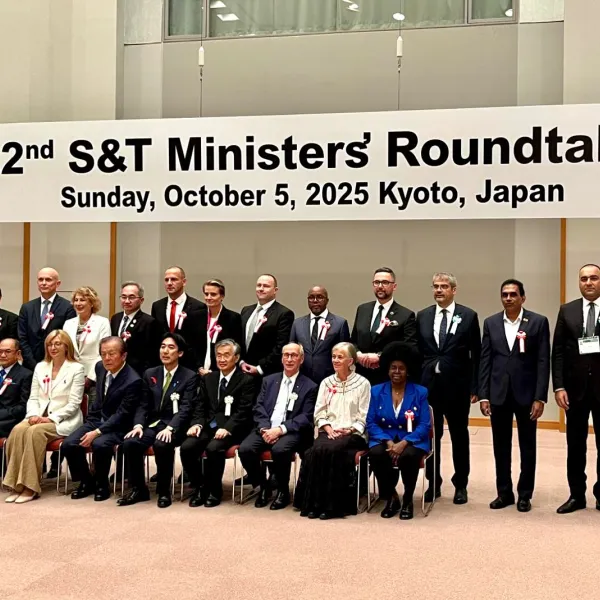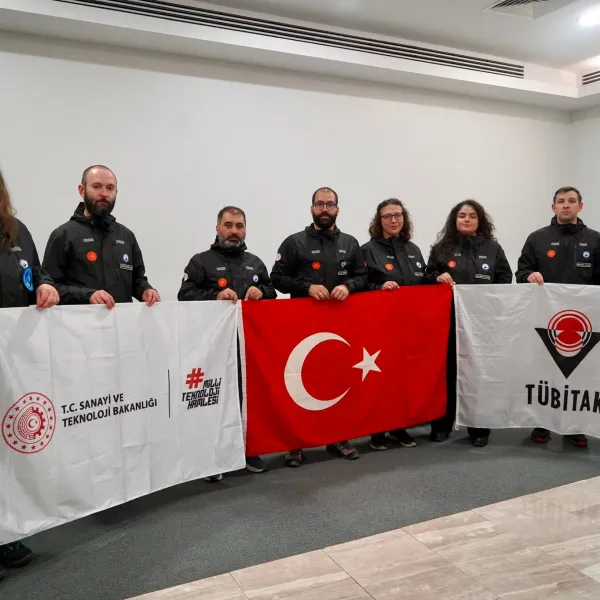
The High Technology Platforms Evaluation Meeting within the scope of TÜBİTAK 1004 Program was held at TÜBİTAK Gebze Campus with the participation of Minister of Industry and Technology Mehmet Fatih Kacır, Higher Education Council (YÖK) President Prof. Dr. Erol Özvar and TÜBİTAK President Prof. Dr. Hasan Mandal.
At the meeting attended by 20 Platform Managers and Partners supported under the TÜBİTAK 1004 Center of Excellence Support Program, presentations were made on the projects carried out on the platforms.
Speaking at the meeting, Minister of Industry and Technology Mehmet Fatih Kacır said, "We will increase these resources in the coming period. As long as these works turn into works that will create a multiplier effect in Türkiye's development journey and create added value."
Minister Kacır said, "Türkiye has no choice but to realize a national technology move. Unless Türkiye makes a leap and a breakthrough in critical technologies, we cannot overcome the middle income trap. We cannot increase our per capita income to thirty or forty thousand dollars. It is not very important that we become richer. Even if we say we should be content with what we have, we cannot maintain our claim of full independence in this geography. So they will not leave us alone in this geography either. Therefore, we have to realize this move in every field."
"In many fields, Türkiye has made a great breakthrough in the last 20 years. Undoubtedly, our scientists and researchers have made unique contributions to this breakthrough. But we need to shift gears a little bit, we need to increase our excitement and speed a little bit more, we need to increase our cooperation to a higher level." Kacır reminded that "I attach great importance to this program. I followed it carefully during my deputy ministry. And we have always tried to provide the support we can. It may seem modest when we compare it with the world. But under Turkish conditions, we have actually provided the most important resource focused on this field so far. We will increase these resources in the coming period. As long as these studies turn into works that will create a multiplier effect in Türkiye 's development journey and create added value."
"We will integrate the support we offer to scientific studies with the investment incentives we offer to industry and the R&D incentives we offer to the technology ecosystem"
Emphasizing that even though "Science" was removed from the name of the Ministry in 2018, science activities have not been removed from its sphere of influence and responsibility, Kacır said, "We still have a very high relationship with scientific activities in TÜBİTAK, the Turkish Academy of Sciences, R&D incentives, and we have a high responsibility in these areas. We are also aware of this responsibility. And we are aware that the coexistence of science, industry and technology policies is very vital for Türkiye. With this understanding, we will integrate the supports we currently offer to scientific studies with the investment incentives we offer to industry and the R&D incentives we offer to the technology ecosystem in the coming period."
Minister Kacır said, "We will make arrangements to ensure that the private sector in the Industry and Technology ecosystem contributes more to your work. Thus, our hope is to accelerate the investments and R&D activities of the private sector on a scientific basis. Hopefully, when we achieve this, the available resources will rapidly reach several times what they are today."
"Strengthen your international cooperation"
Minister Kacır also made some warnings to the Platform executives: "The platform is as strong as its weakest link within itself. Those in governance have a responsibility to make quick changes in the players if necessary, instead of covering up the problems. Another suggestion would be to strengthen international cooperation. These should not turn into a research activity in which we shut ourselves in. We heard some studies on European Union programs in the presentations. Let me express that I see these as very valuable. But the world is not limited to the European Union. The European Union's share in global R&D expenditures is not as ambitious as it used to be. In some sectors, in some areas, China alone is more than the European Union. In fact, it spends several times the research budget of the European Union. Countries such as Korea, Japan and India have very serious research funds and research institutions. In other words, there are many institutions around the world with which we can cooperate. I think being effectively aware of these and trying to carry out projects in this portfolio together with them can speed us up. There are things they are ahead of us in. There are things we are ahead of them. We can create a win-win situation. In other words, while I am pleased that our research ecosystem has turned its face towards Europe, I recommend not to hold its neck. It is useful for everyone to look in all directions. "
Minister Kacır said, "I just want you to know that as the Minister of Industry and Technology, we are with you and behind you until the end. As long as these works will contribute to Türkiye's development journey as soon as possible. You should continue your efforts to get results that will strengthen the claim of full independence. We will continue to work hard to mobilize the existing ones and to find new opportunities for the missing ones."
"Platform structures come into play in addressing new challenges"
TÜBİTAK President Prof. Dr. Hasan Mandal explained the importance of the 1004 program in his evaluation of the meeting: "Now, of course, there are challenges we face in the world on a global scale and in our country. The difficulties experienced. The best example of this started with the pandemic. During the pandemic period, we saw how unprepared even the most developed countries were. They could not be sufficient to create solutions to needs and problems. And now, if we look at climate-oriented topics, food supply security, energy security, water security, the difficulties in accessing critical raw materials are increasing. Our past approaches to knowledge generation will not be sufficient to create solutions to today's challenges. The very urgent and urgently needed topics are the challenges of very complex problems. Therefore, in the search for solutions, the answer to the question of what, why, and how becomes much more critical. So we know what the problem is. We know why it is important, but we need innovative approaches on how we can create solutions. When we listen to our 1004 platforms, which we designed in 2018 for this very purpose, which we started in 2019, and today, especially the first 8 of which are in effect, we see that it is progressing rapidly in terms of contributing to its purpose."
Explaining what a platform is, Mandal said, "It means an approach where all relevant stakeholders come together and work together. Within these platforms, there are universities that will teach the knowledge, and there are those who will use the technology to be developed. Therefore, it is very important that the institutions that teach knowledge and the institutions that will use that knowledge work together. At the point of reaching the result, learning from each other, the output of one being the input of the other, and the transformation of this into a technological product, we tried to bring the separate structures together with a platform, platforms."
"The European Commission states that this program is an exemplary model"
Reminding that the first examples of this program were presented at the meeting, Mandal said, "We see it at important points of need such as health and agriculture. We see it in the items where Türkiye's exports are high, and again we see it in climate-oriented topics such as energy, food, water, etc. These initiatives for these solutions under many headings such as energy, food, water, etc. are at the point of producing information with one dimension and at the point of training human resources with an important dimension. Because within these platforms, we have experienced professors as well as young scientists and scholarship holders. Therefore, this is important at the point of investing in the future."
Prof. Dr. Mandal said, "These are not closed structures, but they are trying to create solutions together with institutions that are involved in this process on an international scale, especially with institutions in Europe. We find this very valuable and the European Commission specifically states that this program is an exemplary model, a model of Türkiye. Because we have developed this model ourselves, we do not have a reference to take this model from any other country and apply it. In other words, our country develops these platforms itself. And the fact that our Minister of Industry and Technology and the President of the Council of Higher Education (YÖK) attended today's meeting is important that this work is owned by the main actors. This shows that the expectation for Türkiye’s future is much more critical, in other words, more responsibility needs to be taken. I think that our 20 platforms, 8 of which we have listened to, 8 of which are existing, which are now significantly past the halfway point, and our 12 platforms that may be included in August, our newly started platforms, will have important missions and tasks in the development of critical technology in the future of our country, but more importantly, in creating solutions for the needs of our country. Therefore, I think that we have realized a successful and effective meeting."
Mandal said, "We will first evaluate the outputs of this meeting among ourselves. And then we will come together again with the platform managers and evaluate what we can do better together." He shared information about the process.
What is TÜBİTAK 1004 - Center of Excellence Support Programme?
TÜBİTAK 1004-Center of Excellence Support Program was created to enable higher education institutions' research infrastructures to specialize in cooperation with industrial R&D and design centers and public R&D units and to transfer the products and technologies they develop to the private sector by becoming a center of excellence.
In addition to enabling competition and the correct and effective use of public resources, the large number of researchers and scholars supported will provide the necessary critical mass in priority areas and critical technologies determined within the scope of national goals and policies.
Within the scope of the 1004 Program, 8 research programs were supported within the scope of the first call published in 2018 and 12 research programs were supported within the scope of the second call published in 2021 for strategic goals such as the design and production of battery packs using advanced technological materials and new manufacturing technologies, the development of micro-medical products for chronic complex diseases and cancer, the development of value-added advanced nanotechnological materials and systems, food supply security, sustainable agricultural technologies, neurotechnology and the development of new technologies for the infrastructure of smart cities in order to create new patents, develop domestic and national products and increase Türkiye's competitiveness in international platforms.
A total of 1550 researchers and 959 scholarship holders from 70 universities, 109 private sector organizations, 6 research infrastructures and 6 public R&D units are involved in 252 different projects with 20 supported research programs. These supports contribute to the goal of raising qualified human resources required for the national technology move.





